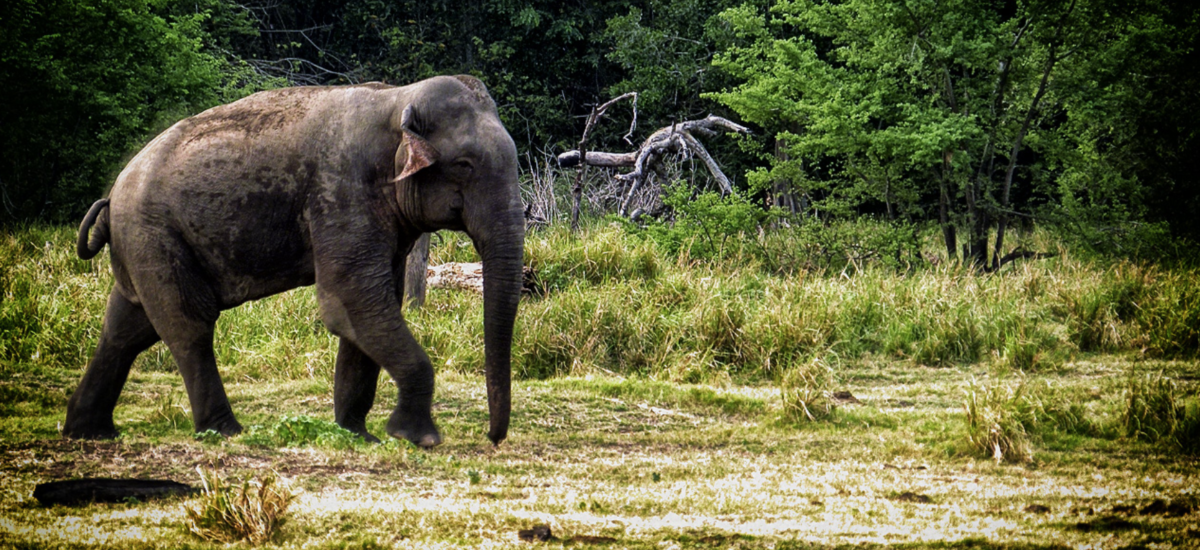Featured photo courtesy Sri Lanka Elephant
Several months on, the effect of the Easter Sunday attacks on April 21, 2019 is being felt even in remote areas like Wasgamuwa, affecting both children and elephants.
As an indirect result of the attacks, the world’s first and only EleFriendly bus which runs along an ancient elephant corridor in Wasgamuwa may not be able to operate any more. The bus is owned by the local community and run by the Sri Lanka Wildlife Conservation Society (SLWCS). It is funded by contributions from the SLWCS’s international volunteer program. Since the Easter attacks, the number of volunteers and visitors to the SLWCS base in Wasgamuwa has decreased dramatically. Since May of this year, there have only been around three volunteers. This is a massive drop from the more than thirty volunteers that came every month prior to the attacks. The loss of volunteers and the valuable contributions they bring, have greatly affected the organisation’s ability to fund the EleFriendly bus, which costs around Rs 60,000 a month to operate.
The children in the Wasgamuwa area are worried at the thought of losing the EleFriendly bus as they ride it daily to and from school. For some, the distance between their home and school is over 5 kilometres. Twelve year old Hansika believes she will miss a lot more school without the bus. ‘I feel very scared to go to school if the bus doesn’t come. Sometimes our parents are busy in paddy fields so they can’t come with us to go to school and guard us from the elephants’. She explained how riding the EleFriendly bus is safer than any other method of transport they would normally use, such as walking, tuk tuks, bicycle or tractors.
Before the launch of the EleFriendly bus, human-elephant conflict (HEC) took a terrible toll on the lives of many elephants and humans in the Wasgamuwa region. The human – elephant conflict affects not just Wasgamuwa, but other areas of Sri Lanka too. HEC occurs as a result of encroachment, when humans and elephants fight for the same resources. More than 200 elephants and over 80 humans die each year, throughout Sri Lanka. The EleFriendly bus helped reduce this conflict by 80% in the Wasgamuwa area since its launch in 2016. The bus minimises violent interactions with elephants, keeping both humans and elephants safe. In addition to helping reduce HEC, the bus also provides safe transportation to around 120 children who use it daily to get to and from school.
SLWCS founder Ravi Corea fears what may happen if the bus were to stop running. In a recent interview he stated, ‘Currently we see over 70 elephants moving through the corridor and inhabiting the adjacent Weheragala Tank area and forests. If the bus stops running, the situation is going to revert back to what it was. People are going to start shooting elephants in fear of them being a danger to their children, homes, crops and their own lives. This would be such a huge reversal of what we have managed to achieve in terms of coexistence in the Tree Hut Elephant Corridor.’
Not only would it be a reversal of what the organisation is trying to accomplish, but it would also have a negative impact on the children of the area and their ability to attend school. Attendance is likely to drop as children will be too afraid to walk the long distances to school. The threat of bumping into an elephant along the way is too great.
The EleFriendly bus is an important part of the villagers’ daily lives. Let’s hope that the volunteers return to Wasgamuwa so that the bus can keep doing what it does best: keeping the humans and elephants in the area safe and sound.
Editor’s Note: Also read- “The World’s First EleFriendly Bus: A Success Story” and “World’s First EleFriendly Bus launches in Wasgamuwa“

